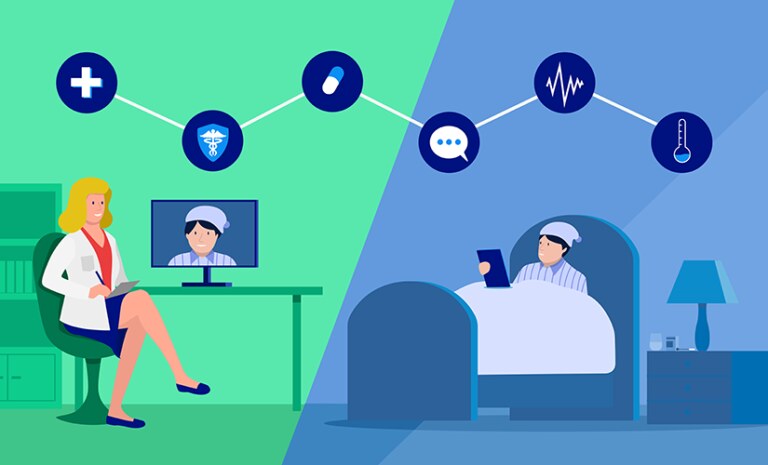In recent years, telemedicine has emerged as a transformative force in the healthcare industry. It allows patients to receive medical care remotely, breaking the barriers of distance and time. Explore the pros and cons of telemedicine as this article examines its impact on patients, healthcare providers, and the overall healthcare system.
Understanding Telemedicine
What is Telemedicine?
Telemedicine, also known as telehealth, is the use of technology to deliver healthcare services remotely. It involves virtual consultations, remote monitoring, and electronic health records, enabling patients and doctors to connect without being physically present.
Pros of Telemedicine
-
pros and cons of telemedicine and Convenience
Telemedicine has greatly improved access to healthcare, particularly for individuals residing in remote or rural areas. Patients can consult with specialists from the comfort of their homes, reducing the need for travel and saving time and money.

-
pros and cons of telemedicine Reach
Telemedicine has expanded the reach of medical expertise beyond geographical boundaries. Patients can connect with renowned specialists from around the world, getting the best possible care without leaving their hometowns.
-
Time Efficiency
Telemedicine eliminates the need for patients to wait for long hours in crowded waiting rooms. It streamlines the appointment process, reducing waiting times and improving overall patient satisfaction.
-
Cost-Effectiveness
By reducing travel expenses and the need for in-person visits, telemedicine helps patients save money. It also benefits healthcare facilities by optimizing resource allocation and reducing administrative costs.
-
Remote Monitoring and Management
Telemedicine enables continuous monitoring of patients with chronic conditions. Healthcare providers can remotely track vital signs and symptoms, making it easier to manage chronic illnesses effectively.
-
Swift Emergency Response
In emergencies, telemedicine plays a crucial role by providing immediate medical advice and assistance. It aids in stabilizing patients before they can be transferred to a physical healthcare facility if needed.
Cons of Telemedicine
-
Limited Physical Examination
One of the primary challenges of telemedicine is the inability to perform hands-on physical examinations. While advanced technology like remote diagnostic tools can help, some medical conditions may still require in-person evaluations.
-
Technology Dependency
Telemedicine relies heavily on technology, such as internet connectivity and devices. Technical glitches or network issues may disrupt consultations, affecting the quality of care.
-
Privacy and Security Concerns
Remote consultations raise concerns about patient data privacy and security. Healthcare providers must ensure robust cybersecurity measures to safeguard sensitive medical information.
-
Lack of Personal Connection
Telemedicine may lack the personal touch that comes with face-to-face interactions. Some patients may feel disconnected or uncomfortable discussing sensitive health issues remotely.

-
pros and cons of telemedicine Access
Not everyone has equal access to technology, especially in underserved or economically challenged areas. This disparity could result in some individuals being excluded from the benefits of telemedicine.
FAQs
-
Is telemedicine suitable for all medical conditions?
While telemedicine is suitable for many medical conditions, certain cases may require in-person evaluations and treatments. It is essential for healthcare providers to assess each patient’s needs on a case-by-case basis.
-
Can telemedicine replace traditional healthcare entirely?
Telemedicine complements traditional healthcare but is unlikely to replace it entirely. In-person visits will still be necessary for certain diagnoses, treatments, and surgical procedures.
-
How can I ensure the security of my medical data during telemedicine consultations?
To ensure patient data is secure during telemedicine consultations, healthcare providers must implement robust data encryption and privacy measures. Moreover, these measures are crucial for maintaining trust and confidentiality.
-
What if I don’t have access to a reliable internet connection for telemedicine consultations?
To address this issue, some telemedicine platforms offer alternatives, such as phone consultations, to cater to patients with limited internet access.
-
How does telemedicine benefit patients with chronic illnesses?
Telemedicine allows healthcare providers to monitor and manage chronic conditions more effectively, leading to better outcomes and improved quality of life for patients.
Conclusion
Telemedicine has revolutionized healthcare by bridging the gap between patients and healthcare providers. Its accessibility, cost-effectiveness, and remote monitoring capabilities have made it an invaluable tool in modern medicine. However, challenges regarding physical examinations, technology dependence, and data security remain to be addressed. Striking a balance between virtual care and in-person visits will be essential for ensuring equitable and comprehensive healthcare for all.



